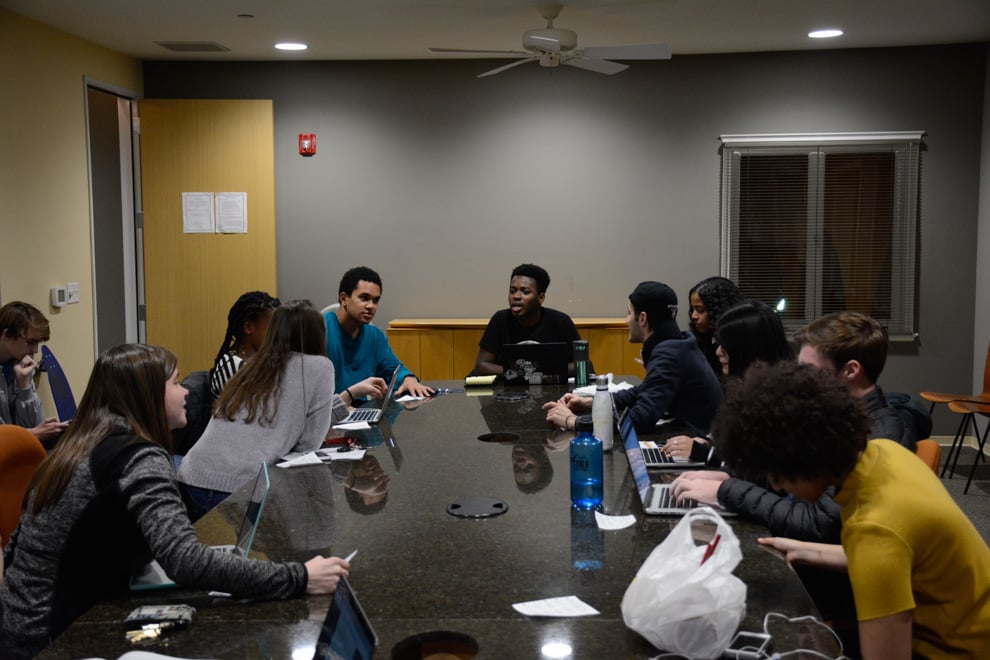Following suit with presidential candidate Julián Castro ’96, who visited campus on March 23 to express support for the Service Employees’ International Union Local 2007 (SEIU Local 2007) while they renegotiate contracts for service employees, the 20th Undergraduate Senate introduced a resolution in support of the workers at Tuesday’s meeting.
Additionally, the body passed a resolution addressing issues facing undergraduate veterans as well as a bill mandating future senators to write annual individual progress reports.
Senators Gabe Rosen ’19 and Matthew Wigler ’19 also discussed a bill to create a committee to reform the ASSU election process in 2020, which was tabled for discussion in the next meeting.
SEIU Local 2007
In a show of support for service workers on campus, Senator and deputy chair Jianna So ’21 proposed a resolution supporting the union while they renegotiate contracts with the University. The resolution cites problems such as “chronic understaffing, unsafe working conditions, and … unlivable wages that force them to commute for hours.”
“The most telling statistic to me is that 78 percent of workers [surveyed] on campus felt that they have been bullied, harassed or discriminated against at work,” So said. “Because of all these reasons, student support is crucial in labor advocacy on campus.”
The resolution would express support for the petition for SEIU’s requested changes to the existing contract, which include increased wages and affordable housing, and recognizes service workers as part of the Stanford community.
Johannes Raatz, a full-time organizer from SEIU, spoke at the meeting, emphasizing the lack of affordable housing for service workers.
“There is an intense affordability crisis here in the Bay Area that is causing people to be displaced, so this has been resulting in homelessness among service workers who work here on campus,” Raatz said. “What I’m asking is for student support, to stand in solidarity with these workers.”
The resolution will continue to be discussed at the Senate’s next meeting.
Support for undergraduate veterans
Wigler advocated for a resolution to “better serve veterans at Stanford,” citing institutional difficulties that affect undergraduate students who are veterans. Wigler mentioned the Stanford financial aid policies that use the benefits provided by the GI bill to reduce financial aid given to veterans.
The resolution also mentions a variety of measures that would support the undergraduate veteran population. These include ensuring that that the enrollment of veterans should be made a priority by Stanford admissions, that Veterans’ Day be made a University-acknowledged official holiday and that the Financial Aid Office review policies that pertain to veterans and their families.
Representatives of the undergraduate veteran community expressed their personal sentiments toward the bill and issues facing veterans on campus.
“So many of the [existing] policies are geared towards graduate students … all of the grad students who I know feel well taken care of. [For undergraduates], that’s different,” representative Adam Behrendt said. “A large part of the value of this is just saying, ‘Even though you’re not normal for here, we’re going to include you in the family.’”
The resolution was passed unanimously.
Senate reform and institutional knowledge
As the Stanford campus gears towards the upcoming election, the existing body will strive to make sure that the incoming wave of senators will be well-equipped to take on the position.
In order to equip potential new senators with more institutional knowledge and increase transparency within the Undergraduate Senate, So and Senator Martin Altenburg ’21 continued discussion of a bill that mandates all senators to create annual reports about their work on projects and committees. These reports must assess the impact of each senator’s efforts throughout the year.
The bill was passed unanimously.
In addition, Wigler and Rosen co-authored a bill that would require the formation of a standing committee in the coming Senate term that would reform the ASSU’s electoral process. The committee would create measures that would take effect in the 2020 elections.
“We want to make sure that this task force will actually continue its accountability [and] that it has a non-dissolvable structure,” Rosen said. “We want to make sure that going forward after this Senate that we are able to have a concrete change to some of the things going on in the elections.”
Rosen and Wigler declined to express their own suggestions for electoral reform, but said that they would relegate that task to the committee.
“The electoral system that we use sets the tone, sets the priorities for everything that we do in the year ahead,” Wigler said.
Further changes to and finalization of the bill will be discussed in the next meeting.
This article has been corrected to reflect that Senators Gabe Rosen ’19 and Matthew Wigler ’19 introduced the bill to create a committee to reform ASSU elections, not the ASSU Executives. The Daily regrets this error
Contact Anushree Thekkedath at anuthekk ‘at’ stanford.edu.
